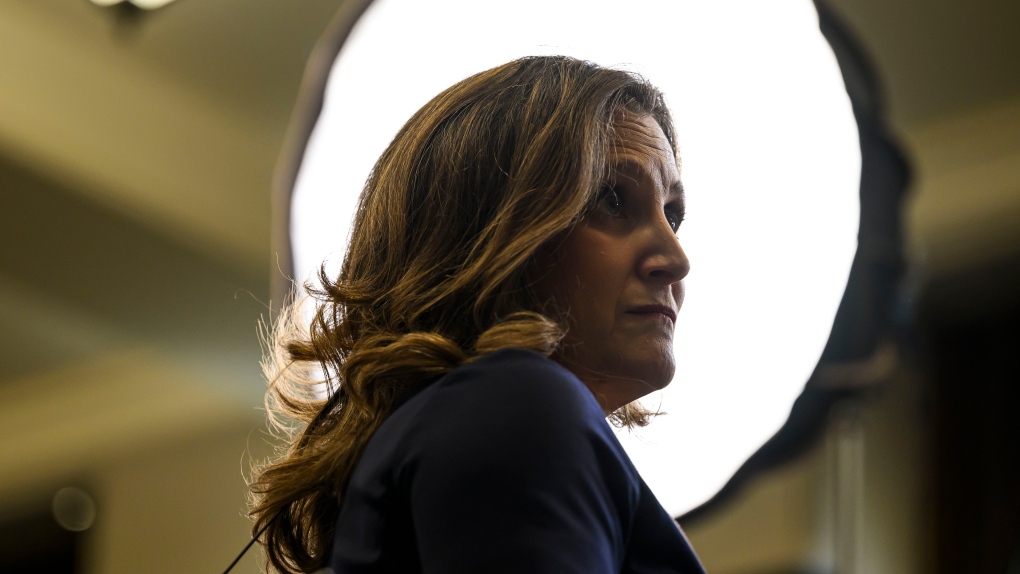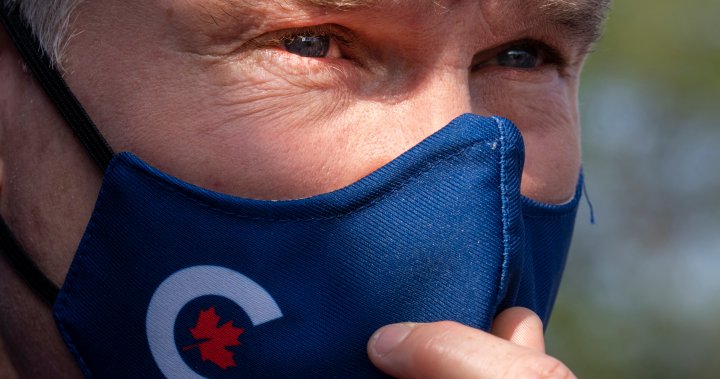The Conservative Party has identified 13 federal ridings where they suspect their candidates were targeted by foreign influence campaigns in the recent federal election, Global News has learned.
The party was briefed by Canada’s two main intelligence agencies about potential foreign interventions against their candidates during the election, two party sources told Global News.
There is no smoking gun. But a senior party source and independent disinformation researchers suspect the Conservatives’ stance on China’s Communist regime made them a target.
“It certainly looks like there was some kind of orchestrated campaign by some entity that was probably not a (Canadian) political party,” said the source.
Global News is protecting the source’s identity to allow them to speak frankly about the party’s internal investigation.
“We’ve identified as many as 13 seats where something happened in. Most of them we were competitive in, but not all of them.… There’s suspicion of potential mail-in ballot fraud, we’ve heard cases of potential foreign government-paid campaign workers who were getting brown envelopes of cash to do stuff for other campaigns, we’ve heard of illegal advertising.”
The source said the party was also blasting out messaging on WeChat, a Chinese-language social media platform, and found that its content was quickly removed.
The party is not blaming its loss in the Sept. 20 election on foreign interference, the source said. Some of the 13 ridings identified by its officials could only be charitably described as long shots – such as Mississauga Centre, where Liberal cabinet minister Omar Alghabra won with 54 per cent of the vote.
Conservative partisans have also criticized Erin O’Toole’s campaign for failing to connect with diaspora communities in cities like Toronto and Vancouver – a failing O’Toole’s own people acknowledge in private conversations.
The alleged foreign interference may not have tipped the scales against the Conservatives, but many of the ridings identified by the party were a lot closer than Mississauga Centre – like Richmond Centre, where incumbent Alice Wong lost by fewer than 1,000 votes, or Steveston-Richmond East, where incumbent Kenny Chiu lost by roughly 3,500 votes.
The other ridings identified by the party are Coquitlam-Port Coquitlam and Fleetwood-Port Kells in British Columbia, and Markham-Stouffville, Markham-Unionville, Richmond Hill, Willowdale, Don Valley North, Scarborough-Agincourt, Aurora-Oak Ridges-Richmond Hill, and Newmarket-Aurora in Ontario.
Multiple party sources told Global News that Canada’s two intelligence agencies – the Canadian Security Intelligence Service (CSIS) and the Communications Security Establishment (CSE) – briefed the Conservatives during the campaign. The two agencies are part of a task force set up by the Liberal government to guard Canadian elections against foreign interference.
A senior party source said the two agencies continued to brief Conservative party officials on foreign influence campaigns until the Liberal minority government was sworn in.
“It’s been complete radio silence since then,” the source, who agreed to discuss sensitive national security matters on the condition they not be named, told Global News.
Party officials refused to discuss the content of the briefings given by CSIS and CSE.
In a statement, CSIS said the intelligence community did not detect foreign interference threats that rose to the level of jeopardizing Canada’s ability to hold “a free and fair election” or that warranted warning the public.
“Canada’s security and intelligence agencies are aware of and remain vigilant to these activities,” CSIS spokesperson John Townsend said in a statement to Global News.
“(We) use a wide array of measures on an ongoing basis to detect and counter efforts by foreign actors to interfere in our democratic process.”
A recent report by Canada’s spy watchdog confirmed CSIS used “threat reduction measures” to “disrupt the threat posed by hostile foreign states” to the 2019 federal election. But next to nothing is publicly known about what those “measures” were, or what hostile foreign states attempted to intervene in that election.
Cory Hann, the Conservatives’ director of communications, said the party has “serious concerns” about “the apparent coordinated and sophisticated campaigns that targeted some of our candidates across the country in the last election.”
“There have been ongoing conversations with officials and security agencies,” about the issue, Hann said in a statement.
“We can’t comment on any briefings received from CSIS or CSE at this time.”
Cherie Wong, the executive director of Alliance Canada Hong Kong, said several pro-Beijing candidates were also defeated in the recent federal election, “so it’s not necessarily that they have this power to directly influence the result of the election.”
“But on the community level, there has been efforts to create misinformation and disinformation on WeChat and Weibo and group chats and whatnot to circulate about certain parties and certain candidates. That we have observed,” Wong said in an interview.
“But it is really difficult to pin down whether that is a Chinese state actor…. You can’t really say that yes, this is performed by a Chinese state actor, because we don’t know who they are or if they’re associated with the Chinese state.”
Wong also cautioned against the “dangerous line” of conflating Chinese Canadians with state actors — particularly at a time when Sinophobia and hate crimes against Canadians of Asian descent are rising. She was also critical of the Conservatives’ outreach efforts in communities with strong Chinese Canadian ties.
“There is a lack of outreach in this election that the Chinese community did not get,” Wong said.
“Is it just a campaign ran, or is it that the community didn’t trust them? We can’t tell.”
Foreign influence in Canadian elections
Foreign influence in democratic elections is nothing new, and exists on a spectrum – from former U.S. president Barack Obama endorsing Prime Minister Justin Trudeau in 2019, to clandestine influence operations targeting specific ridings and parties.
But the issue became a pressing policy concern after the 2016 U.S. presidential election. The American intelligence community has publicly acknowledged the Russian government intervened in that election to aid President Donald Trump.
Similar attempts have played out in other western democracies, including France, the U.K. and Canada. The activities observed in recent Canadian elections, however, have not met the threshold of requiring a public statement from senior federal officials tasked with reviewing election interference intelligence.
That isn’t to say it’s not happening. Independent research group DisinfoWatch recently claimed to have observed “Chinese government media and pro-Beijing actors publishing and promoting disinformation narratives on various platforms, including Global Times, WeChat, and local Canadian-Chinese websites.”
The Chinese state-run outlet Global Times reported during the campaign that the Conservatives’ stance on Canada-China relations would “invite counterstrikes” should O’Toole become prime minister.
“The Chinese government has repeatedly demonstrated its readiness to advance its interest in Canada by directly manipulating Canadian political debate and policy through the use of disinformation, threats, intimidation, and influence operations directed at Canadian diaspora groups,” DisinfoWatch, which is tied to the Macdonald-Laurier Institute, reported earlier this month.
“Such interference threatens to undermine the integrity of Canadian democracy and erode public trust in our democratic processes and institutions.”
The Chinese embassy in Ottawa did not immediately respond to Global News’ request for comment.
The Conservatives took an aggressive stance on Canada’s relationship with China in the recent federal election – the centrepiece of the party’s unusually detailed foreign policy platform.
“We must stand up to the Communist government of China. Our quarrel is not with the people of China – part of an ancient civilization that has contributed much to humanity,” the party’s 2021 platform read.
“Instead, our issue is with China’s communist government and leadership. The communist leadership represents a clear and rising threat to Canadian interests – and our values. They’ve abducted our citizens, targeted our economy, and intimidated members of the Chinese Canadian community.”
A senior party source acknowledged that the party did not do enough to communicate that point – that the Conservatives’ quarrel is with the Chinese government, not its people.
“I think it’s always a matter of how we communicate.… But I don’t see any position change happening (on Canada-China relations). The leader and the party have been very clear where they stand,” the source said.
© 2021 Global News, a division of Corus Entertainment Inc.







More Stories
Ukraine’s ambassador slams Canada for Airbus sanctions waiver on critical Russian mineral | CBC News
New Indigenous loan guarantee program a ‘really big deal,’ Freeland says at Toronto conference
Green deputy leader sentenced to jail for Fairy Creek old growth protests